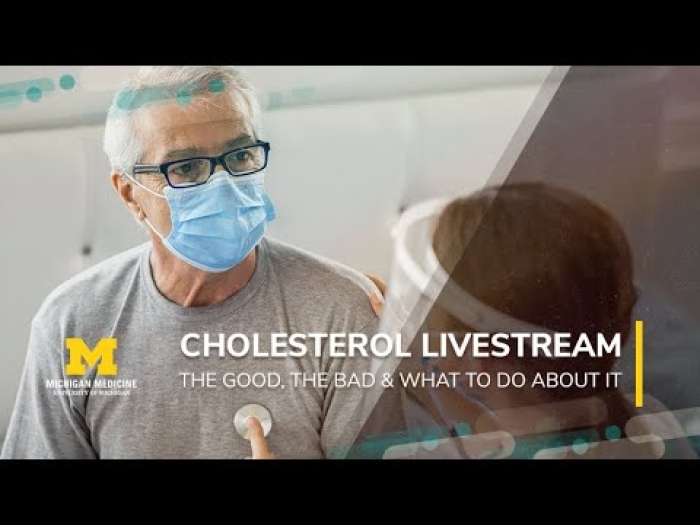Taking care of your heart by eating healthy isn’t so hard once you understand what it all means. A nutritionist explains.
9:35 AM
Author |

This article is part of a mini blog series dedicated to bringing awareness about your heart health during the American Heart Association's national #HeartMonth. Miss the first three installments? Catch up on 10 heart tests your doctor might order, and what they mean, how to check your blood pressure at home and getting heart healthy with a Mediterranean diet.
Nearly one-third of all deaths in the world can be attributed to heart disease. But many of these deaths could be prevented, according to emerging evidence that shows the link between diet and heart disease.
In fact, says Michigan Medicine Registered Dietitian Nutritionist Faith Blair, "The food you consume can influence many aspects of heart health, including blood pressure, inflammation and cholesterol levels, which are all risk factors for heart disease."
Blair, who counsels cardiovascular patients about heart healthy nutrition, shares five tips to minimize your risk of heart disease related to the foods you consume.
1. Pay attention to nutrition labels.
As you may have noticed, the nutrition label on food packages looks a little different now. Many of the FDA changes to the nutrition label, which went into law earlier this year, were made to help reduce chronic diseases such as obesity and heart disease.
The goal is to help consumers become more aware of what they're eating and how it impacts their health. Have you ever eaten more than one serving size out of a snack container? Now, companies are required to disclose both the number of calories per serving as well as the amount of servings per package.
Calories from fat are no longer listed, because the type of fat you consume is more important than the total amount of fat, Blair says. The new label lists the fats that should be limited because of their ties to cardiovascular disease, including saturated fat and cholesterol.
There are also four vitamins and minerals listed on the food label as "nutrients of concern." These have been identified as nutrients many Americans don't consume enough of, like vitamin D and potassium.
2. Recognize healthy fats.
There are two natural types of fat, saturated and unsaturated, as well as a synthetically created fat known as trans fat.
All fat molecules have long tails that may be saturated (completely filled with hydrogen atoms) or unsaturated (not completely filled with hydrogen atoms). When the fatty acid tail is filled with hydrogen, or saturated, the tail is stiff and rigid. Rigid tails can block off arteries and lead to heart disease, Blair explains. Saturated fats are solid and are found in rich foods like butter, milk and marbled meats.
Comparatively, unsaturated fatty acid tails are not rigid and can move or flow. Unsaturated fats are termed healthy fats because they provide antioxidant effects in the body while remaining fluid. Unsaturated fats are a liquid at room temperature and are found in plant-based oils, avocados, nuts and fish.
Like Podcasts? Add the Michigan Medicine News Break to your Alexa-enabled device or subscribe for daily updates on iTunes, Google Play and Stitcher.
Omega 3 fatty acids, found in many types of fish — including salmon, herring and sardines —help fight inflammation and protect the heart.
Trans fats were synthetically created and lead to increased risk of heart disease. These have now been required by law to be removed from the American food supply.
Blair tells her patients the goal for a healthy heart is to minimize saturated fats and trans fats and increase their daily intake of unsaturated fats.
3. Find flavorful alternatives to salt.
Many patients with cardiovascular disease are encouraged to ditch the salt shaker. Too much salt can elevate blood pressure, which increases the risk of developing cardiovascular disease.
But heart patients aren't the only ones who should be aware of how much sodium they're eating on a daily basis. The average American consumes approximately 3,400 milligrams of sodium each day, far beyond the recommended 2,300 milligrams (approximately 1 teaspoon). In addition to increasing blood pressure, a salty diet can put you at risk for an enlarged heart muscle, heart failure, kidney disease and osteoporosis.
Contrary to popular belief, the majority of sodium we consume is already in our foods, particularly processed foods. Sodium is prevalent in the American diet because it's used to preserve many of the foods we consume, so reading the nutrition label is an important way to know how much salt you're consuming.
Because most canned foods are high in sodium, Blair recommends sticking to frozen or fresh vegetables instead. Be sure to avoid frozen vegetables with added sauces, though. Purchasing fresh meats and freezing them yourself can reduce sodium intake by at least 25%. Salt is also found in many seasoning blends and boxed items.
Instead, make your own seasoning blends without the salt. Blair recommends trying garlic and onion powder, coriander, cumin or paprika to flavor your food.
And although the salt we sprinkle on our food at the dinner table isn't the main culprit of our high sodium intake, we should still avoid adding it to our food.
4. Avoid unhealthy processed food.
Processed food is technically any food that's altered from its original state, but not all processed foods are bad for you, Blair explains. For example, a cut up cantaloupe can be viewed as a processed food because it has been changed from its original state, but it's still a healthy choice, she says.
MORE FROM MICHIGAN: Sign up for our weekly newsletter
However, what most of us think of as processed food is unhealthy because it's chemically processed and made from refined ingredients and artificial substances, Blair says. Processed foods are typically very high in sodium, contain artificial ingredients, can be high in refined carbohydrates and tend to be lower in nutrients and fiber. While processed foods are convenient, they can also lead to health issues.
For optimal heart health, Blair's patients focus on combining single ingredient foods that contain no added chemicals. They choose fresh foods instead of processed whenever possible. Some of the healthiest choices include leafy green vegetables, whole grains, berries, walnuts and almonds, fatty fish and dried beans, she says. Garlic, olive oil, edamame and avocado are also among some of the healthiest foods to add to your daily diet.
5. Embrace a healthy plant based diet.
A healthy plant based diet is focused on fruits, vegetables, whole grains, legumes, beans and healthy oils. It limits animal proteins such as meat, dairy and eggs, as well as highly refined foods such as bleached flour and refined sugar.
But plant based diets aren't always healthy if you're filling up on foods like refined grains, potatoes and sugar-sweetened beverages. Researchers have shown limited improvement on cardiovascular disease when individuals become vegetarian yet consume unhealthy plant based foods, Blair explains.
Following a healthy plant based diet can improve your heart health, help you feel more energized, reduce your risk of developing other health conditions such as diabetes and help you achieve a healthy weight.
Researchers have also found that healthy plant based diets improve cardiovascular conditions such as angina (chest pain) and atherosclerosis, which occurs when arteries become narrowed or blocked due to a buildup of a cholesterol-containing substance called plaque. This is attributed to the rich fiber, vitamins and minerals a plant based diet provides.

Explore a variety of health care news & stories by visiting the Health Lab home page for more articles.

Department of Communication at Michigan Medicine
Want top health & research news weekly? Sign up for Health Lab’s newsletters today!





